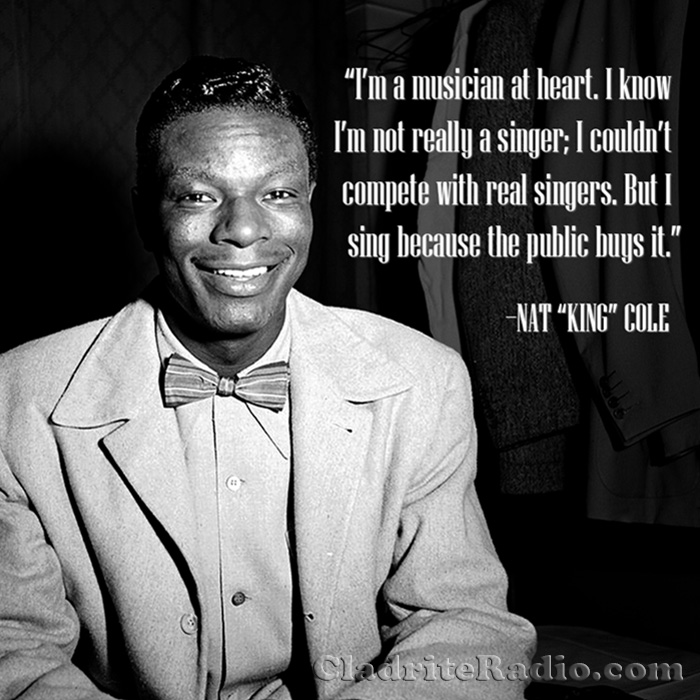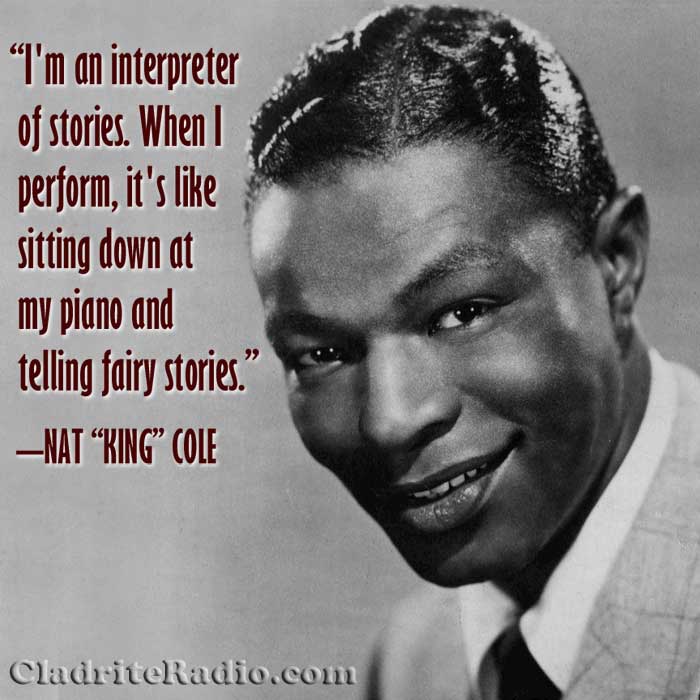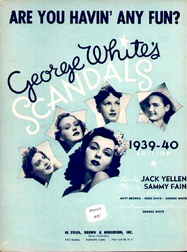Nat “King” Cole was born Nathaniel Adams Coles 98 years ago today in Montgomery, Alabama. One of the true giants of American music, Cole, as well-regarded as he still is, does not, in our opinion, get sufficient credit for his talents, accomplishments and contributions. Here are 10 NKC Did-You-Knows:
- Cole was the second of five children born to Edward and Perlina Coles. The family moved to Chicago when Cole was four, where his father entered the ministry. Cole’s mother was a church organist who gave young Nat his first keyboard instruction. He began to take formal lessons at 12 and learned to play pop, jazz and even classical music.
- Cole attended Wendel Phillips High School, where gospel and R&B legend Sam Cooke also attended some years later. Cole began performing professionally as a teenager, dropping the S from Coles and shortening his first name to Nat. His older brother, Eddie, a bass player, was a member of Cole’s first band.
- The two siblings cut their first record, under Eddie’s name (probably because Nat was still a minor), in 1936. It was during this time that Nat was given his “King” nickname, said to be a play on the Old King Cole nursery rhyme.
- Cole found his first success as part of a trio (though they weren’t yet the King Cole Trio, as they would come to be known, but the King Cole Swingsters). Radio was key to their rise in popularity, and they became a popular act in the Los Angeles area. Nat’s piano playing was his claim to fame, but he had started to add vocals to a number of the tunes in the trio’s repertoire.
- In 1943, Nat “King” Cole and the trio signed with the fledgling Capitol Records, and their success financed the company’s growth. To this day, the round structure that is the company’s headquarters, built in Hollywood in 1956, is referred to as “the house that Nat built.”
- That same year, Cole notched his first mainstream vocal hit with Straighten Up and Fly Right, one of his own compositions. The song based on an African-American folk tale that his father had used in his sermons.
- In 1944, Cole became a Freemason, joining Southern California’s Thomas Waller Lodge No. 49, which was named in honor of jazz legend “Fats” Waller.
- Cole’s popularity in the 1950s was unprecedented for an African-American performer. In that decade, though it’s not well remembered today, Cole’s records outsold Frank Sinatra‘s by a wide margin. Cole even recorded a trio of albums in Spanish (phonetic only—he didn’t hablan español). His Spanish was reportedly pretty bad, but many Spanish-speaking listeners found his clumsy efforts charming and his popularity only increased.
- Cole became so popular that on November 5, 1956, he began hosting his own television show, The Nat “King” Cole Show,” on NBC; he was the first African-American artist to host such a show. The show did fine in the ratings, but no sponsor for the program was ever found, a must in those days. Just over a year after it hit the airwaves, Cole pulled the plug on the show. The strain of operating a show without a sponsor’s backing was too much. After the show’s demise, Cole was quoted as having quipped, with a mix of good humor and bitterness, “Madison Avenue is afraid of the dark.”
- In 1964, Nat “King” Cole began to experience fatigue and back pain until finally, some time after collapsing during a show at the Sands Hotel and Casino in Las Vegas, he was convinced to consult with a doctor while performing in San Francisco. He was diagnosed with lung cancer and given just a few months to live, but he kept working, recording his final sessions in early December. He died, aged 45, in Los Angeles on February 15, 1965, less than three months after his diagnosis. The severity of his condition had been largely hidden from the public, so the news of his passing proved a shock to his fans across the country and around the world. It’s painful to think of all the wonderful music he could have created had he lived as long as some of contemporaries, like Sinatra and Tony Bennett.
Happy birthday, Nat “King” Cole, wherever you may be!



